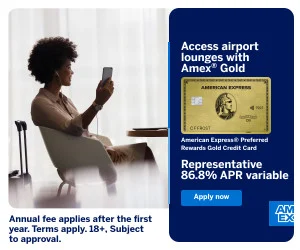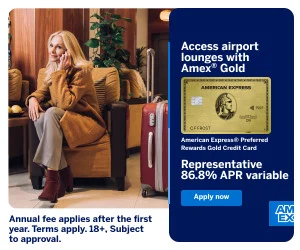-
Has anyone else had another round of this annoying stuff?
Just received an email asking for exactly the same info they required just over a year ago, for myself and all my supp cardholders – ID, proof of address, bank statements, income etc.
Last year I had to do it for each one of of my card accounts & every supp card on each account, this one it is just platinum + supps on that account. Also, it appears to be only referencing AML this time, not AML/KYC as it was last year.Very frustrating (and somewhat embarrassing, having to ask my elderly supp card parents for a copy of their bank statement again), especially as no info or anything else on the account has changed.
Over the phone they also contradicted the email with the time required for response, and also the information required…doesn’t inspire much confidence in the process.I also remember last year they still suspended all my accounts on the deadline, despite having completed the form and submitting all documents by the deadline, resulting in an upheld complaint and a couple of hundred in compensation. Not holding my breath that the same won’t happen again!
Interesting as one of the uses of a supp card is to separate your own different types of expenses.
I cannot see how Amex has the right to interrogate anyone for details related to a supp card that’s been issued. After all, the main cardholder remains liable for everything on a supp card and the supp cardhlder is not considered a cardholder as everything is the responsibility of the main cardholder.
I think Amex is overreaching.
Different if one or more supp card transactions appeared to be involved in a crime eg had been traced as used to pay for the rental of a vehicle used in a bank robbery. But given the legalities that the main cardholder is responsible for all supp cards and their use, if it’s Amex querying then they should only have recourse to the main cardholder. Anything more detailed is for the police to ask. If it doesn’t warrant the police then why are the details of any supp cardholder anything to do with Amex? There is no relationship of Amex with supp cardholder.
“each one of of my card accounts & every supp card on each account”
How many accounts and supp cards on each do you have?
I cannot see how Amex has the right to interrogate anyone for details related to a supp card that’s been issued.
It is possible the details given while applying conflicts with public data. Or the public data has changed since application.
Amex not only has the right to seek this information but is obliged by its regulator to make appropriate enquiries.
I’m afraid that the thread title including the word “rubbish” explains exactly why they are looking for information; failing to take the enquiries seriously as part of the requirements of having unsecured credit extended to you. These enquiries are not random but relate either to the conduct of the account or external information received that contradicts the details they have on file.
Interesting as one of the uses of a supp card is to separate your own different types of expenses.
I cannot see how Amex has the right to interrogate anyone for details related to a supp card that’s been issued. After all, the main cardholder remains liable for everything on a supp card and the supp cardhlder is not considered a cardholder as everything is the responsibility of the main cardholder.
I think Amex is overreaching.
Different if one or more supp card transactions appeared to be involved in a crime eg had been traced as used to pay for the rental of a vehicle used in a bank robbery. But given the legalities that the main cardholder is responsible for all supp cards and their use, if it’s Amex querying then they should only have recourse to the main cardholder. Anything more detailed is for the police to ask. If it doesn’t warrant the police then why are the details of any supp cardholder anything to do with Amex? There is no relationship of Amex with supp cardholder.
There are so many mistakes in this post, but most importantly, Amex has a legal requirement to undertake KYC, conduct AML checks and on-going due diligence. It does not matter if it is the main cardholder or the Supp. The main card holder may be on the hook for the financial transactions, but there is only one of the risks that has to be monitored and mitigated. What if the elderly parent is a sanctioned terrorist!? The point of all these checks is to make it more difficult for the bad things to happen, not to help the police after the fact.
@EscapeGoat – almost all financial institutions take a risk based approach to refreshing KYC and AML checks. Depending on how risky they think a company or an person is, they will refresh it every 6 months, year, 3 years, 5 etc. You might have something in your background (are you North Korean!?) or in your or your supps transactions (buying lots of dual use goods!?) that trigger this.“each one of of my card accounts & every supp card on each account”
How many accounts and supp cards on each do you have?
Three accounts, plat, and two credit – the newest card is over 15 years old.
Parents are supps on all, plus my partner on plat, and extra supps on the plat for me (diminutive name, not in some bogus name) and none of these are new cards or newly added supps.
Hardly heavy usage!I’m afraid that the thread title including the word “rubbish” explains exactly why they are looking for information; failing to take the enquiries seriously as part of the requirements of having unsecured credit extended to you. These enquiries are not random but relate either to the conduct of the account or external information received that contradicts the details they have on file.
Sorry if my title offended you, but I took it very seriously last time, complied with the whole thing to the letter of their instructions and in a timely fashion, and still had my cards suspended in error, for which they paid me £400 in compensation as an apology.
I’ve been a plat card holder for two decades (same account, no churning). No information has changed, no address changes, no dings on my credit or new credit lines taken out or anything else. Usage pattern is consistent and quite simple, and my parents & partner rarely, if ever, use the supp cards – it’s there for them for use if needed, for insurance, and a couple of other benefits.Having to do it all again so soon, is, in fact, rubbish.
I think Amex is overreaching.
Are you a Guardian columnist by any chance? Your default instinct is to think big banks (or financial companies) are to blame for everything?
As JDB mentioned in another similar thread, when these posts appear, the more you ask questions, the more the issues surface, like an ‘onion being peeled’.
I can imagine your frustration – the paperwork can be onerous. The fact the accounts were suspended last year even after you complied (and obviously passed) suggests that a system flagged the account, but the checks were done manually and the system was not then updated. That might be why you were flagged again. Again though, nothing might have changed on your side but that doesn’t mean someone with the same name was not added to Bank of England or OFAC or other naughty list!
@EscapeGoat – you didn’t offend me in any way. I merely remarked upon the inappropriate clickbait type headline. Amex is complying with its regulatory obligations. There will be a valid reason why you are being asked for the information again. From the information you have provided, you were compensated for Amex’s failure to process the information you provided correctly, resulting in a suspension. Most Amex customers are never asked for the information being sought from you notwithstanding Amex’s ongoing checks on every card account. There is something in the background that is causing Amex to initiate these checks; it really isn’t random.
@EscapeGoat – almost all financial institutions take a risk based approach to refreshing KYC and AML checks. Depending on how risky they think a company or an person is, they will refresh it every 6 months, year, 3 years, 5 etc. You might have something in your background (are you North Korean!?) or in your or your supps transactions (buying lots of dual use goods!?) that trigger this.Haha, no I’m not North Korean, just regular UK born and UK passport holder. My supp cardholders have not used the cards at all in the last 12 months, aside from being swiped a couple of times to access lounges, so definitely no Carlos the jackal connection going on here.
Late to the party!
I think a more balanced analysis is in order — some directly blame Amex, some the cardholder.
Completely recognising Amex’s rights and obligations, I am of the opinion that, this does not necessarily prove that for this particular instance, Amex did not over-reach. We all speculate as we do not know what Amex knows.
This discussion always reminds me, behold I am now overreaching, the stop and frisk debate in the US.
Does the police have the right? Yes as in some cases it leads to results and rightful arrests.
Is it overreachingly used and abused? Surely.I suspect the number of cards and supps is the issue.
If one was a money launderer, I suppose you could buy lots of goods and have your “dodgy” customers pay you cash. You might then buy a run-down property, spend the cash doing it up and then flipping it.
Even if you aren’t suspected of doing this – and, as you say, the old folks haven’t used their cards, it may be that your pattern of card ownership is enough to trigger their suspicions.
You may have read today of former Bank of England economist being debanked because of political risk – even though he used to be part of the regulator!
Sometimes it is not you, it is the system. Me, I can’t be bothered with the fight – so for the first time in 40 years I now bank with more than one bank, just in case.
Ps. The comments above are not advice on money laundering!
‘Three accounts, plat, and two credit – the newest card is over 15 years old.
Parents are supps on all, plus my partner on plat, and extra supps on the plat for me (diminutive name, not in some bogus name) and none of these are new cards or newly added supps.’
If I were looking at this, you have three cards with AMEX – 1 x Plat (which confers benefits) and 2 x AMEX Credit cards (which do not?). Makes sense that your parents and partners are supps on Plat (Insurance benefits) but why are you a supp on your own Plat account (did I read that wrong)? Why are your parents supps on your 2 x credit cards too? Do they have issues getting credit themselves?
Its not just Amex, lots of lenders are toughening up. I get there are rules and regulations they have to follow with their “just doing my job mate” and “computer says no” type attitudes.
But if you are a bad actor, you know how to circumvent the rules and regulations. Just look at the spike in luxury cars being sold to Azerbaijan now.
For the rest of us, it’s just a real inconvenience!
If your parents and partner don’t use the supp cards maybe it’s worth closing them?
‘Three accounts, plat, and two credit – the newest card is over 15 years old.
Parents are supps on all, plus my partner on plat, and extra supps on the plat for me (diminutive name, not in some bogus name) and none of these are new cards or newly added supps.’If I were looking at this, you have three cards with AMEX – 1 x Plat (which confers benefits) and 2 x AMEX Credit cards (which do not?). Makes sense that your parents and partners are supps on Plat (Insurance benefits) but why are you a supp on your own Plat account (did I read that wrong)? Why are your parents supps on your 2 x credit cards too? Do they have issues getting credit themselves?
That is correct, although I did get it slightly incorrect – they are only supps on the plat + one of the credit cards (not both) which is the one gives benefits. No issues with their credit at all, just there to be used if needed and for the benefits if needed.
As for my own additional cards, I’ve had the same plat account for a couple of decades – back then you could automatically at sign up request an ‘A.C.’ (additional card) card on the account (which has ‘cardholder name A.C’ on it). This was specifically designed and advertised as a method to separate business expenses from personal. I also took out another one at a later date in a diminutive name in a different (non platinum) colour, for use in places where platinum draws attention, and it is also useful, say, to hand to someone else if something is needed from a store or something, and again, it enables you to separate spend in different ways. None of those are new supp cards.
The probable culprit here hasn’t really been mentioned. It’s possible (but very unlikely on the facts given) that the OP is money laundering, or doing something else dodgy. It’s possible (but unlikely) that Amex are being difficult for the sake of it, or (slightly more likely) by error.
The real issue is the ever increasing rules and regulations being imposed by the government – that’s who I’d be blaming.The probable culprit here hasn’t really been mentioned. It’s possible (but very unlikely on the facts given) that the OP is money laundering, or doing something else dodgy. It’s possible (but unlikely) that Amex are being difficult for the sake of it, or (slightly more likely) by error.
The real issue is the ever increasing rules and regulations being imposed by the government – that’s who I’d be blaming.There will be something that has triggered it.
If your parents are in an apartment with a share of the Freehold, or form part of a residents association, first thing to check is to see if their company is red-flagging on Companies House pending strike off for late accounts. Time to check your own Credit Report too.
Wonder if Amex is cracking down on those getting multiple supp cards in the names of people who don’t share the same address.
Seems to be a common thing with the other thread where the OP had 6 supp cards and I believe was also the supp for the other people cards.
One could in effect get 25 cards with 5 people and exploit Amex offers.@BBbetter Where does it say they have to be at the same address? My grown up children have supp cards on my Platinum and all it asks for is a permanent UK address for them. I do agree that obtaining supplementary cards that are only used for offers would be suspicious. I’ve given up reminding the kids that there is an offers section on the app.
The probable culprit here hasn’t really been mentioned. It’s possible (but very unlikely on the facts given) that the OP is money laundering, or doing something else dodgy. It’s possible (but unlikely) that Amex are being difficult for the sake of it, or (slightly more likely) by error.
The real issue is the ever increasing rules and regulations being imposed by the government – that’s who I’d be blaming.The government hasn’t changed the rules and regulations as it doesn’t set them. The Financial Conduct Authority sets the rules based on powers granted to it by the last Labour government. The requirements for firms are largely based on outcomes and principles as well as rules and guidance. In respect of the sort of checks being reported in this thread and others here about account closures, these are determined by the firm as it’s up to firms how they meet the outcomes/principles and rules. There’s quite a spectrum of how different firms view these – historically Amex would be seen to have been at the very slack/lax end and someone like HSBC imposing a much stricter interpretation. In recent times Amex has suffered worse charge offs than other card providers so they are now shutting the stable door to try and stabilise the poor credit position. Some of the actions taken are also suggestive of a recent regular regulatory check that highlighted weaknesses in processes that Amex is trying to correct.
Obviously, as soon as anyone gets a check, lots of people rush to criticise Amex but there’s always a reason – most people will never have a check at all because Amex’s ongoing behind the scenes checks tally, so the firm is happy. Amex has terms and conditions, but those cannot possibly cover all eventualities, so merely complying with those isn’t enough and in the most recent lengthy account cancellation thread, there were a great many red flags that made the account suspension and closure rather unsurprising. The excessive supps as referenced above was but one.
@JDB your first sentence is an important one and is the backbone of all statutory regulators.
The primary legislation (the Act) sets out the broad areas of what the regulator will and will not regulate and the powers they will have – the so called regulatory framework. The Act will give the regulator powers to draft regulations.
The regulator, once created, will then develop the detailed regulations to implement the provisions in the Act and then produce guidance for businesses and individuals to follow. Their sponsor department will approve those – basically because the sponsor department has to present the regulations – via Statutory Instrument – to Parliament for approval. It also means making amendments is a lot quicker as little parliamentary time for debate and votes is required.
The government then basically lets the regulator get on with the job until it basically doesn’t want it to do it anymore or there’s some scandal about the regulator and their failings to act in some way or there is a scandal about something not being regulated but should be.
And that whole regulatory framework is often misunderstood here.
For example the CAA doesn’t fine airlines for not meeting EU261 requirements because it doesn’t have the powers to not because it can’t be bothered to.
- You must be logged in to reply to this topic.
Popular articles this week:




















